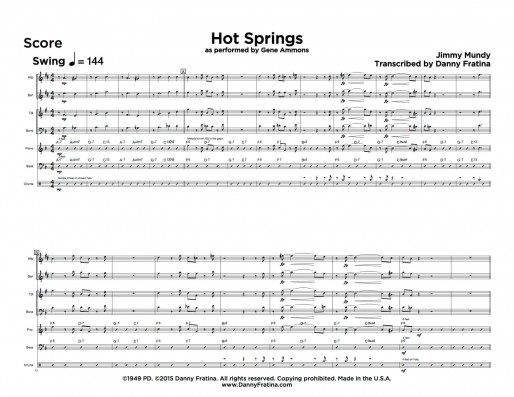-
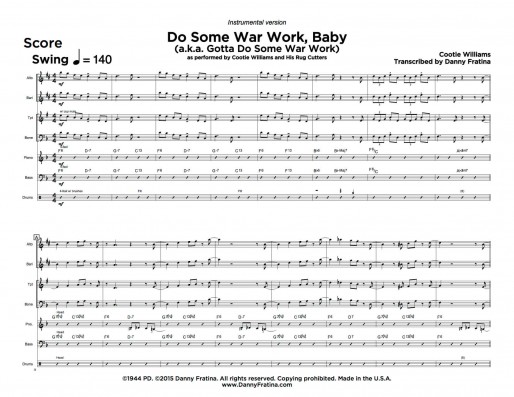 This Cootie Williams number is a great easy piece that still authentically swings hard. The original recording of Do Some War Work, Baby has a vocal chorus in the middle, but this transcription replaces it with a solo chorus for bari sax and alters the ending to make it fully instrumental. The vocal version can be found here.
This Cootie Williams number is a great easy piece that still authentically swings hard. The original recording of Do Some War Work, Baby has a vocal chorus in the middle, but this transcription replaces it with a solo chorus for bari sax and alters the ending to make it fully instrumental. The vocal version can be found here.Instrumentation Ellington 7-Piece Style Swing Era Level 1 TEMPO  = 140
= 140Trumpet
Range
-
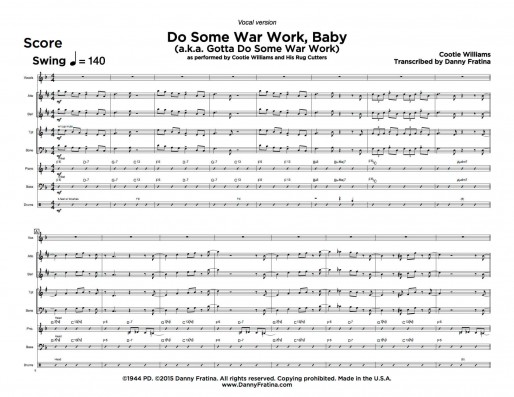 This Cootie Williams number is a great easy piece that still authentically swings hard. Do Some War Work, Baby has a vocal chorus in the middle, but an instrumental adaptation is available here, replacing the vocals with a solo chorus for bari sax and altering the ending.
This Cootie Williams number is a great easy piece that still authentically swings hard. Do Some War Work, Baby has a vocal chorus in the middle, but an instrumental adaptation is available here, replacing the vocals with a solo chorus for bari sax and altering the ending.Instrumentation Ellington 7-Piece Style Swing Era Level 1 Vocals Male TEMPO  = 140
= 140Trumpet
Range
-
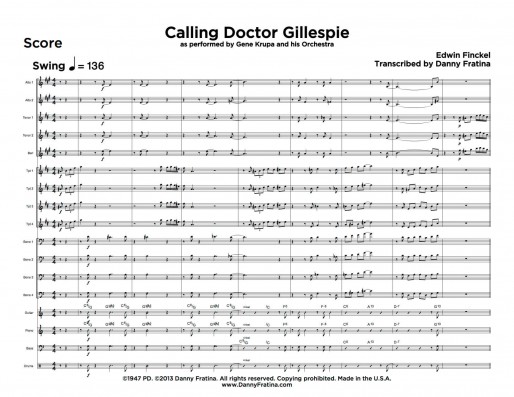 This Edwin Finckel rarity swings hard and doesn't shy away from its bebop influences. Straddling the line between the two eras of jazz, Calling Doctor Gillespie features some infectious melodies and singable shout choruses. High Gs for lead trumpet are all optional - without them the highest note is a Bb above the staff. A couple of solos in the middle round this out.
This Edwin Finckel rarity swings hard and doesn't shy away from its bebop influences. Straddling the line between the two eras of jazz, Calling Doctor Gillespie features some infectious melodies and singable shout choruses. High Gs for lead trumpet are all optional - without them the highest note is a Bb above the staff. A couple of solos in the middle round this out.Instrumentation Big Band Style Swing Era Level 3 TEMPO  = 136
= 136Trumpet
Range
-
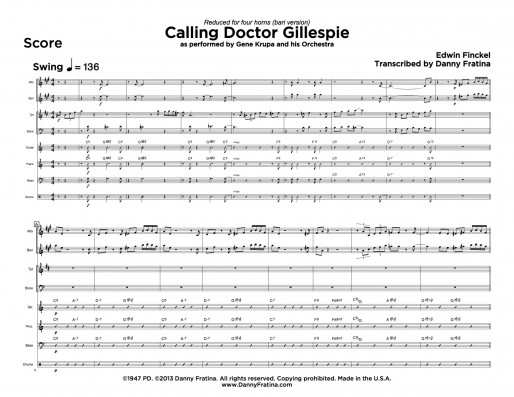 This Edwin Finckel rarity swings hard and doesn't shy away from its bebop influences. Straddling the line between the two eras of jazz, Calling Doctor Gillespie features some infectious melodies and singable shout choruses. A couple of solos in the middle round this out.
This Edwin Finckel rarity swings hard and doesn't shy away from its bebop influences. Straddling the line between the two eras of jazz, Calling Doctor Gillespie features some infectious melodies and singable shout choruses. A couple of solos in the middle round this out.Instrumentation Ellington 7-Piece Style Swing Era Level 3 TEMPO  = 136
= 136Trumpet
Range
-
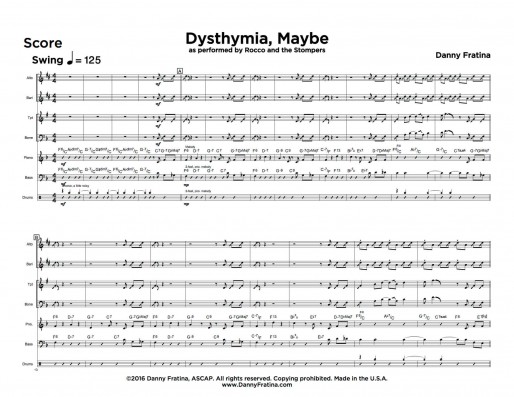 Dysthymia, Maybe is an easy walkin' tune featuring a simplified bluesy unison riff for the melody and easy solo changes in F. This is an easy head tune that gives your horns a nice break while keeping dancers on the floor.
Dysthymia, Maybe is an easy walkin' tune featuring a simplified bluesy unison riff for the melody and easy solo changes in F. This is an easy head tune that gives your horns a nice break while keeping dancers on the floor.Instrumentation Ellington 7-Piece Style Swing Era Level 2 TEMPO  = 125
= 125Trumpet
Range
-
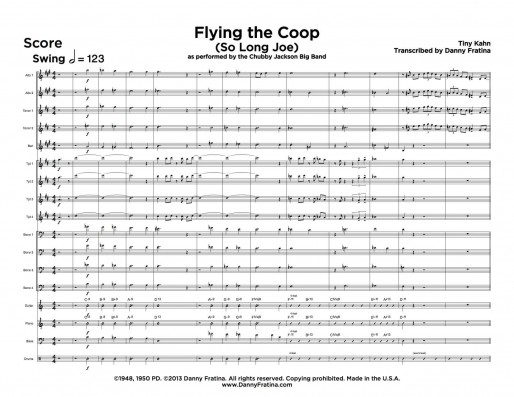 A huge fanfare-ish intro announces this amazing Tiny Kahn tune, and Flying the Coop is quickly off to the races. Unison sax and brass lines at a breakneck tempo fill the head, while the meat of the arrangement features big bebop statements, sax solos, and an old-fashioned trombone chase (an early teaming of JJ Johnson and Kai Winding).
A huge fanfare-ish intro announces this amazing Tiny Kahn tune, and Flying the Coop is quickly off to the races. Unison sax and brass lines at a breakneck tempo fill the head, while the meat of the arrangement features big bebop statements, sax solos, and an old-fashioned trombone chase (an early teaming of JJ Johnson and Kai Winding).Instrumentation Big Band Style Bebop Level 5 TEMPO  = 123
= 123Trumpet
Range
Solo Instrument: Piano
INSTRUMENTATION
STYLE
DIFFICULTY
VOCALS
PERFORMER
